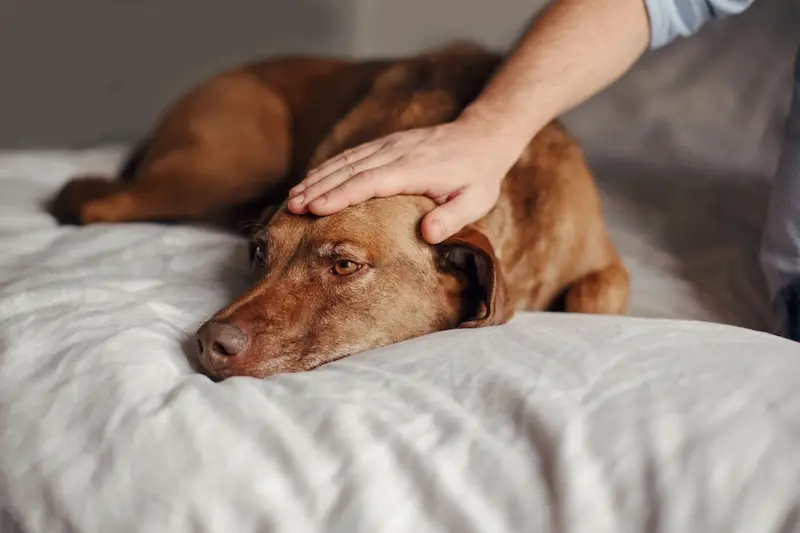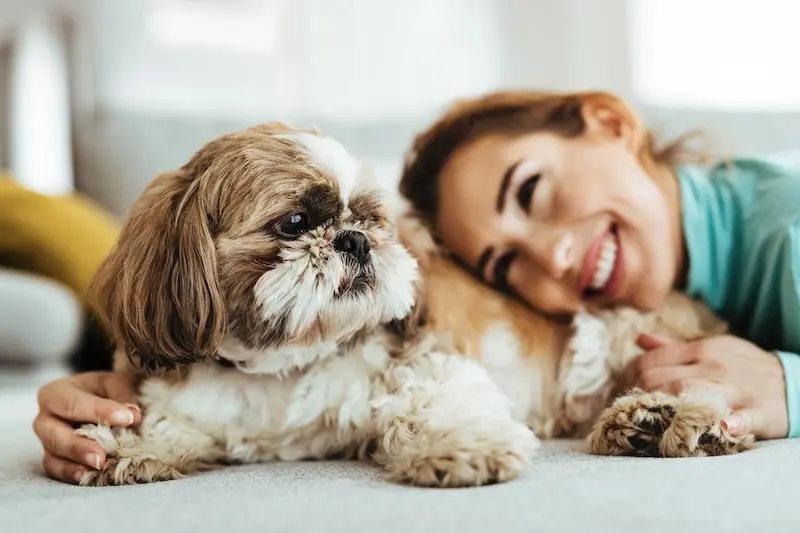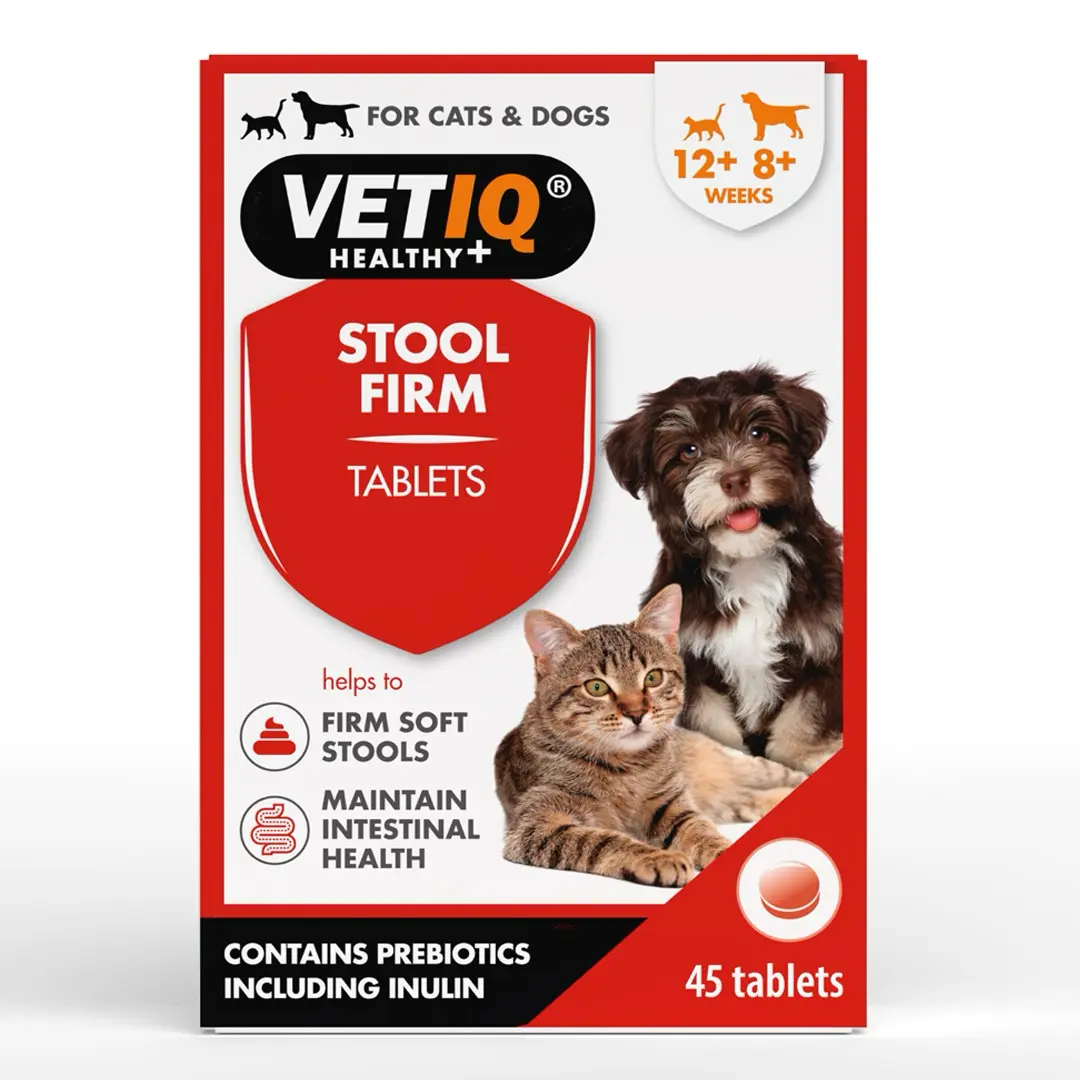Dog diarrhoea is something most dog parents will encounter at some point, and while it’s often harmless and short-lived, it can sometimes be a sign of a more serious issue.
Knowing when to monitor it at home and when to seek veterinary care is key to keeping your dog healthy and comfortable. From spotting red-flag symptoms to making smart dietary changes, knowing how to manage dog diarrhoea is part of responsible pet care.
In this guide, we explore what causes dog diarrhoea, when it’s time to call the vet, and how to support your dog’s digestive health!
What causes dog diarrhoea?
When your dog suddenly needs to dash outside again, it’s often a sign that something’s gone awry in the tummy department! Dog diarrhoea can have many causes, and figuring out what’s behind the mess is the first step toward a cleaner, happier pup.
Here are some of the usual suspects:
- Dietary changes
- Dietary indiscretion (yes, raiding the bin counts!)
- Sudden diet switch
- Stress
- Parasites
- Viral infections
- Food intolerance
- Food allergy
- Lactose intolerance
- Medications
Each of these can upset your dog’s delicate digestive balance, turning a normal walk into a race against time.
Sometimes the trouble starts deep inside, with the intestines (small or large), or even chronic conditions that lead to weight loss and persistent tummy troubles. By understanding the likely culprits, you can better protect your pup’s digestive health and avoid repeat episodes.
Let’s take a closer look at the common causes of dog diarrhoea!
Dietary changes and food sensitivity
Dogs might act tough, but their stomachs can be surprisingly sensitive!
One of the biggest triggers for diarrhoea is a sudden change in diet; switching kibble too quickly or sneaking them a sausage off your plate can send their digestive system into full protest mode!
Food intolerance or allergy is another sneaky cause, and of course, there’s the classic canine crime of eating something they absolutely shouldn’t have!
Whether it’s leftover curry, a dirty tennis ball, or a mystery item from the park, a naughty nibble can quickly lead to loose stools. Gradual food changes and a watchful eye can help prevent these disasters.
Stress and anxiety
You might not think of diarrhoea when your dog is feeling nervous, but their digestive system sure does. Stress and anxiety are often behind those inconvenient (and sometimes explosive!) toilet trips.
Common stress triggers include:
- Travelling or unfamiliar environments
- A new pet or baby in the house
- Moving to a new home
- Big changes to routine
Just like humans, dogs thrive on consistency and calm. Soothing their nerves can go a long way toward preventing stress-induced diarrhoea. A comfy bed, a steady routine, and a few extra belly rubs can work wonders.
Parasites and infections
These tiny invaders can cause big problems. Intestinal parasites like worms and Giardia are notorious for upsetting your dog’s tummy. Add in viral or bacterial infections, and things can get messy fast!
Luckily, regular vet check-ups along with good hygiene, clean water, and the occasional poo check (we know, it’s gross but helpful) can save a lot of trouble down the line!
Medication and health conditions
Even helpful things like medications or vaccines can sometimes trigger a digestive reaction. If your dog’s diarrhoea started after a new treatment, it might be worth checking in with your vet.
Chronic health conditions can also be to blame. Issues like Inflammatory bowel disease (IBD) and pancreatitis can cause persistent diarrhoea. If your dog’s symptoms aren’t improving or if they seem to be losing weight or energy, don’t just hope for the best; a vet visit is a must.
Identifying symptoms of dog diarrhoea
Dog diarrhoea isn’t just about runny poo; it can come with a whole range of clues. Knowing what to look for helps you catch potential problems early and decide when it’s time for home care versus a trip to the vet.
Here’s how to tell the difference between a mild upset and something more serious.
Mild symptoms
Mild cases of dog diarrhoea might include:
- Loose or watery stools
- Needing to go more frequently than usual
- Increased flatulence (yes, those toots!)
- Slight loss of appetite
Most of the time, these symptoms clear up within a couple of days with a little TLC and monitoring. But stay alert; if things don’t improve, the next section is crucial.
Symptoms that need immediate attention
Some symptoms are red flags that require urgent veterinary care. These include:
- Blood or mucus in the stool
- Repeated vomiting
- Lethargy or weakness
- Signs of dehydration
Ongoing diarrhoea lasting more than 48 hours
If your dog’s acting off, seems in pain, or just isn’t themselves, don’t wait; call the vet. It’s always better to be safe than sorry when it comes to your furry friend’s health.
Simple steps to deal with dog diarrhoea at home
Mild cases of dog diarrhoea can often be treated at home with a little patience and a lot of paper towels. The key is to keep things calm, simple, and supportive for your pup’s digestive system.
Make sure your dog is drinking plenty of water to avoid dehydration. When reintroducing food, go slowly with bland options. And remember, less is more until they’re back to normal.
Let’s dive into a few tried-and-tested home care tips!
Temporary fasting and bland diets
Giving your dog’s tummy a short break (12 to 24 hours of fasting) can help it reset. Don’t worry, they’ll forgive you, eventually!
After that, serve small meals of bland food like boiled chicken and rice or plain mashed potatoes. These gentle foods are easy to digest and help firm up their stools.
Just resist the urge to reward their recovery with treats right away; their gut still needs a little peace and quiet!
Hydration is key
Diarrhoea means fluid loss, so keeping your dog hydrated is a top priority.
Encourage them to drink water regularly. If they’re not keen, try flavouring their water with a bit of low-sodium chicken broth or offering dog-safe ice cubes.
Hydration supports recovery, helps prevent complications, and keeps energy levels up.
Limit treats and table scraps
Sorry, doggo, no sneaky bites from the dinner table this time! Treats, especially rich or fatty ones, can prolong the problem.
Stick to the basics while they recover. Once their poo is back to normal, you can slowly reintroduce regular meals and treats, one at a time.
Monitor their condition
Keep a diary of symptoms, food intake, and energy levels for a couple of days.
Improvement should show within 48 to 72 hours, but if things aren’t getting better, it’s time to call the vet. Trust your instincts – you know your dog best!
Tips for preventing dog diarrhoea
The best way to deal with diarrhoea is to stop it before it starts. With a few simple habits, you can help your dog maintain a healthy gut and reduce the chance of future accidents.
Here’s how to keep those bowel movements regular and drama-free!
Gradual diet changes
Introduce new food slowly over 5 to 7 days. Start with a small portion mixed into their usual food, and increase the ratio bit by bit.
This gentle transition gives their digestive system time to adjust without rebellion.
Regular exercise and stress management
A happy, active dog is often a healthy dog. Daily walks, fun play sessions, and a consistent routine do wonders for both digestion and mood.
Stress is a sneaky trigger for tummy trouble, so do what you can to keep their environment calm. Routine, affection, and a few chew toys can go a long way.
Keep your dog’s digestive health on track with VETIQ
Dog diarrhoea might be messy, but it doesn’t have to be a mystery. By understanding the common causes, recognising the signs early, and taking quick, informed action, you can help your pup bounce back to their tail-wagging self in no time.
And when it comes to fast, gentle relief for soft or watery stools, VETIQ Stool Firm Tablets are a pet parent’s best friend. Packed with natural ingredients like pumpkin, pectin, and prebiotic fibre, these clever little tablets help soothe upset tummies, firm up stools, and restore digestive balance, all without any harsh chemicals!
Whether your dog’s had a cheeky snack they shouldn’t have or is recovering from a minor bout of diarrhoea, VETIQ Stool Firm Tablets offer a simple, vet-trusted solution and are suitable for dogs from 8 weeks old!
So, if your furry friend is feeling a little off in the tummy department, don’t panic; keep VETIQ Stool Firm Tablets on hand for those just-in-case moments – because a healthy gut means a happy pet and fewer unexpected clean-ups for you!









